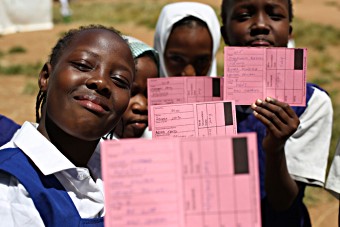
Girls proudly show of their vaccination cards after they were vaccinated against cervical cancer in Eastern Kenya 14 May 2013. Credit: Gavi/2013/Karel Prinsloo.
Geneva, 19 May 2018 – Gavi, the Vaccine Alliance today welcomed the call for coordinated global action against cervical cancer made by the World Health Organization Director-General, Dr Tedros Adhanom Ghebreyesus. Sustainable disease control through significant investments and holistic health system approaches are the first steps on the path to elimination of cervical cancer. Gavi pledged to continue its work to help countries access and introduce vaccines against human papillomavirus (HPV), the primary cause of cervical cancer.
“Scaling up cervical cancer prevention and control strategies should not be delayed, as we have the tools to achieve this goal. With the right commitment from vaccine manufacturers as well as political support, strategic partnerships and investments, this particular battle to improve women’s health can be won,” said Dr Seth Berkley, CEO of Gavi, the Vaccine Alliance.
If action is not taken, cervical cancer is projected to overtake childbirth as the leading cause of death in women, particularly in low- and middle-income countries. Around the world, 266,000 women and girls die each year as a result of cervical cancer. More than 8 out of 10 of these deaths occur in developing countries. This could increase to more than 380,000 by 2030 unless effective action is taken. All five of the countries with the highest numbers of deaths from cervical cancer are in sub-Saharan Africa.
“Cervical cancer is one of the biggest killers of women in the world’s poorest countries,” said Dr Berkley. “The greatest tragedy is that the vast majority of cases are entirely preventable: routine immunisation with the HPV vaccine could stop hundreds of thousands of needless deaths.”
Great progress has already been made: eight Gavi-supported countries have launched the vaccine nationally and 30 countries have started a demonstration programme. Ethiopia and Senegal will begin nationwide vaccination in 2018. As a result, at least one million girls have already been reached with the HPV vaccine with Gavi support.
However, despite strong signs of interest from Gavi-eligible countries and rapid and effective uptake of the vaccine, our goal of immunising 40 million girls by 2020 could be at risk due to supply constraints. One of the two main manufacturers of HPV vaccine is currently unable to meet demand from Gavi countries in the short-term.
Gavi has helped low-income countries to access the HPV vaccine at sustainable prices. We are now working hard with the manufacturers and other partners to ensure that this progress is maintained and that millions of girls in the world’s poorest countries can be protected with this lifesaving vaccine.
Media contacts

James Fulker
Gavi
+41 79 429 5505
+41 22 909 2926

Frédérique Tissandier
Gavi
+41 79 300 8253
+41 22 909 2968
